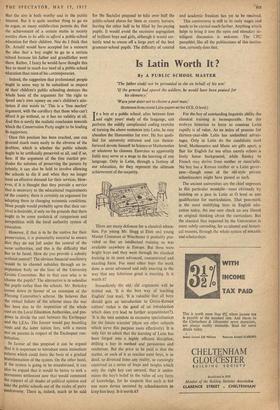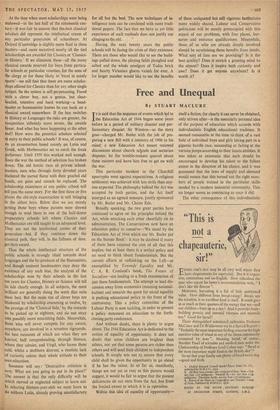Is Latin Worth It?
By A PUBLIC SCHOOL MASTER 'The father could not be persuaded to die on behalf of his son.'
'If the general had spared the soldiers, he would have been praised for his clemency.'
'Warn your sister not to choose a poor man.'
(Sentences from recent Latin papers set for GCE, 0 level.) ITF a boy at a public school, after between four eight years' study of the language, can perform the mildly complicated coding exercise of turning the above sentences into Latin, he may abandon the Humanities for ever. He has quali- fied for university entrance and can thence- forward devote himself to Science or Mathematics or whatever he chooses. Exercises as apparently futile may serve as a stage in the learning of any language. Only in Latin, through a fantasy of our education, do they represent the ultimate achievement of the majority.
There are many defences for a classieal educa- tion. For young Mr. Hogg at Eton and young Master Crossman at Winchester it probably pro- vided as fine an intellectual training as was available anywhere in Europe. But these were bright boys and they went through the classical training in its most advanced, concentrated and exacting form. For most other boys the work done is never advanced and only exacting in the way that any laborious grind is exacting. Is it worth it?
Immediately the old, old arguments will be trotted out. 'It is the best way of teaching English' (not true). 'It is valuable that all boys should gain an introduction to Greco-Roman culture' (what is the good of an introduction which does r.-Dt lead to further acquaintance?). 'It is the best antidote to excessive specialisation for the future scientist' (there are other subjects which serve this purpose more effectively). It is only fair to admit that the learning of Latin has been forged into a highly efficient discipline, drilling a boy in method and persistence and resolution. But the price to be paid is that the matter, or such of it as reaches most boys, is so dead, so divorced from any reality, so cunningly contrived as a series of traps and tangles which only the right key can unravel, that it under- mines the boy's belief in the value of any form of knowledge, for he suspects that each is but one more device invented by schoolmasters to keep him busy. Is it worth it? For the boy of outstanding linguistic ability the classical training is incomparable. For the embryo historian to learn to construe Latin rapidly is of value. As an index of promise for thirteen-year-olds Latin has undoubted advan- tages. Only in Latin do the candidates start level; Mathematics and Music are gifts apart; a flair for English far too often merely echoes a lively home background, while fluency in French may derive from mother or mam'selle. No boy has a Roman mother or a Latin gover- ness—though some of the old-style private schoolmasters might have passed as such.
The ancient universities are the chief negresses in this particular woodpile—most obviously by insisting on a pass in Latin at 0 level as one qualification for matriculation. That pass-mark is the most stultifying item in English edu- cation today, the one sure check on any liberal or original thinking about the curriculum. But the classical bias imparted by the Universities is more subtly corroding, for accidental and histori- cal reasons, through the whole system of rewards and scholarships. At the time when most scholarships were being endowed—in the last half of the nineteenth cen- tury—it was fair to assume that the.best classical scholars did represent the intellectual cream of any particular generation of schoolboys. At Oxford (Cambridge is slightly more fluid in these matters—and more secretive) nearly all the tied scholarships are awarded for Classics or 'Classics- or-History.' If we eliminate these—all the many classical awards reserved for boys from particu- lar schools or particular counties, for the sons of the clergy or for those likely to 'excel in manly aports'—we still find that there are more scholar- ships offered for Classics than for any other single subject. So the system is self-perpetuating. Faced with a clever boy, not a genius, but clear- headed, retentive and hard working—a head- master or housemaster knows he can bank on a classical award somewhere. If the boy switches to History or Languages the risks are greater, the competition infinitely more severe, the awards fewer. And what has been happening at the other,, end? How were the potential scholars selected at entry to their public schools? It was, of course, on an examination based mainly on Latin and Greek, with Mathematics set to catch the freak performer. Until 1939 this worked well enough. Since the war the method of selection has broken down. The old heroic race of private school- masters, men who through forty devoted years sheltered the sacred flame' with their gnarled old hands, are gone and cannot be replaced. The scholarship examiners at any public school will tell you the same story. For the first three or five places the old-style examination is still bringing in the ablest boys. Below that we are merely getting those boys whose parents were shrewd enough to send them to one of the half-dozen preparatory schools left where Classics and Mathematics are still taught to an advanced level. They are not the intellectual cream of their generation—but if they continue down the classical path, they will, in the fullness of time. get their award.
Thus the whole intellectual structure of the public schools is strongly tilted towards dead languages and the by-products of the Humanities, and though eminent headmasters may deny the existence of any such bias, the analysis of the scholarships won by their schools in the last ten years for Classics, History or Science will tell its tale clearly enough. In all subjects, the most brilliant are generally doing the work that suits them best. But the main run of clever boys are blinkered by scholarship cramming at twelve, by the prestige of the 'Classical Side,' by the rewards to be picked up at eighteen, and do not stray into possibly more nourishing fields. Meanwhile, those who will never compete for any award, anywhere, are involved in a senseless rigmarole, the best moments of which are when they are hurried, half comprehending, through Horace, Whom they admire, and Virgil, who leaves them cold, whilst a stubborn distrust, a resolute lack of curiosity colour their whole attitude to their own education.
Someone will say : 'Destructive criticism is easy. What are you going to put in its place?' The answer is' that the only difficulty will be Which starved or neglected subject to leave out. In selecting thirteen-year-olds we must learn to do without Latin, already proving unsatisfactory for all but the best. The new techniques of in- telligence tests can be combined with more tradi- tional papers. The fact that we have as yet little experience of such methods does not justify our clinging to the old.
During the next twenty years the public schools will be facing the crisis of their existence. There are those who would like to see the build- ings pulled down, the playing fields ploughed and salted and the whole amalgam of Tudor brick and hearty Victorian gloom vanish for ever. A far larger number would like to see the benefits of these antiquated but still vigorous institutions more widely shared. Labour and Conservative politicians will be mostly preoccupied with this aspect of our problems, with free places, bur- saries and entrance qualifications. Meanwhile, those of us who are already deeply involved should be scrutinising those benefits from inside. What sort of fare are we providing? Is it the best quality? Does it stretch a growing mind to the utmost? Does it inspire both curiosity and awe? Does it get anyone anywhere? Is it worth it?



































 Previous page
Previous page